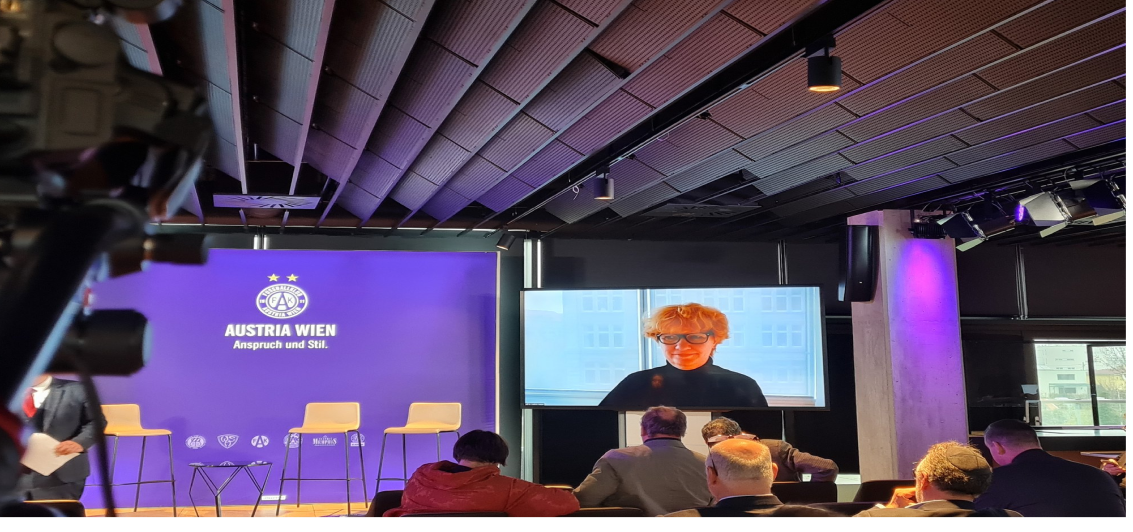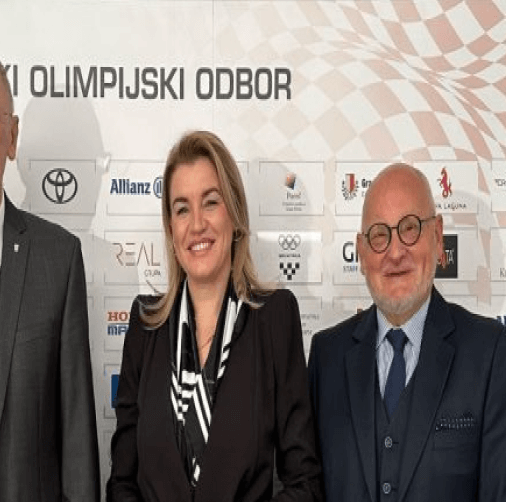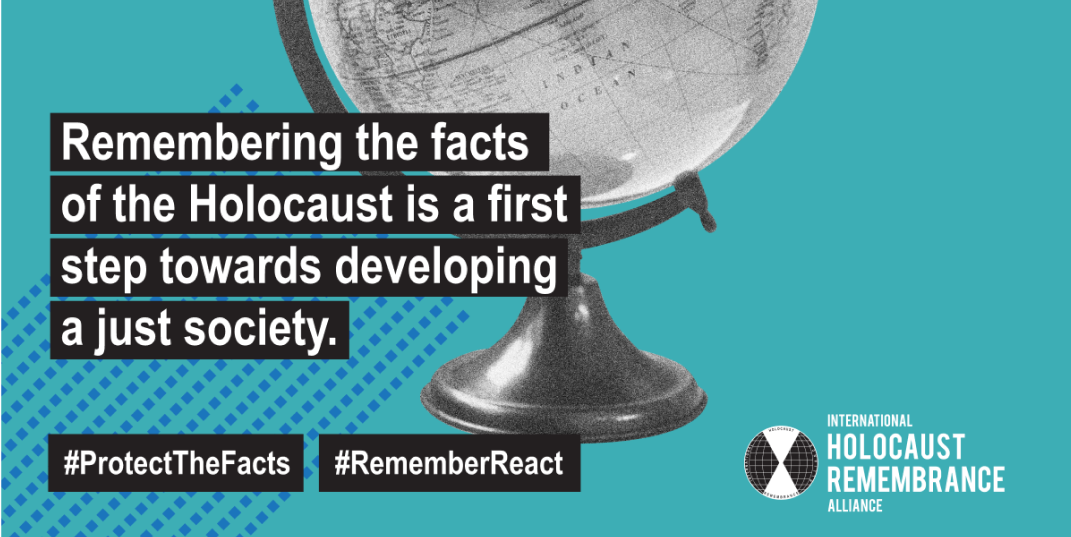
IHRA Secretary General addresses Global Conference on Football’s Role in Combating Antisemitism
The Global Conference on Football’s Role in Combating Antisemitism, held on 11 November, saw the adoption of the IHRA working definition of antisemitism by FK Austria Wien. IHRA Secretary General Kathrin Meyer gave a keynote address at the event, discussing the major impact that football clubs have had on the fight against antisemitism, and how they can continue to help by, for example, raising awareness of Holocaust distortion.
The Conference was hosted by the Chelsea FC Foundation in partnership with The Office of Lord Mann, the International Coalition for Combating Antisemitism (ICCA) and the Jewish Community of Vienna – IKG. Other speakers included Gabriela Ramos, UNESCO Assistant Director-General for Social and Human Science, and Katharina von Schnurbein, European Commission Coordinator on Combating Antisemitism.

Keynote address: Global Conference on Football’s Role in Combating Antisemitism
It was said here today several times: antisemitism exists in our societies, and therefore on the field and in the stadium. Let me share a personal experience with you: my dad was a huge football fan, but I never got into it. It really wasn’t for me. I liked the sport as such, I watched it on TV, but as a child, I didn’t like the loud fans, the chants, the beer being thrown in the stands. And as a young adult I could not overlook the Nazi symbols, the antisemitic chanting. I came to understand the world of football as a space for antisemitism, for extremism. This meant that when the time came for my own son to get involved with sports, I actually discouraged him from getting into football.
After the club declared that it would begin excluding its Jewish members in April 1933, he resigned. Imagine how painful that decision must have been. To leave his community, to leave the football-family that abandoned him and to take off that jersey.
Antisemitism in sports is unfortunately not new. It existed before the Nazi era. And of course, it existed during. After the Nazi seizure of power, sports clubs voluntarily excluded Jews from participation, local ordinances barred them from setting foot on the pitch, Jewish sports clubs were banned and their offices vandalized, and Jewish players were arrested, deported and murdered. All this happened gradually, bit by bit. Exclusion from sports played a major role in excluding Jews from society. Like it is today, football was a huge part of many people’s lives.
One well-known example is Julius Hirsch, a two-time National Champion and one of the best German football players prior to the First World War. By the time the Nazis seized power, he was a youth coach for the Karlsruhe Football Club and on its playing committee. After the club declared that it would begin excluding its Jewish members in April 1933, he resigned. Imagine how painful that decision must have been. To leave his community, to leave the football-family that abandoned him and to take off that jersey. He had been a member of the Karlsruhe club since the age of ten. Hirsch was deported in the spring of 1943 – the last deportation from Karlsruhe to Auschwitz. He was likely gassed upon arrival.
The Nazis tried to erase his name from history. But they have failed. Many of you know his story. In the 1990s, streets, sports halls and prizes started being named after him. His image is featured on the mural at Stamford Bridge, the Chelsea home grounds, together with Árpád Weisz and Ron Jones, two other football stars who were persecuted under National Socialism. But despite those initiatives, antisemitism has not disappeared from the field, from the stadium, from society. What these initiatives reveal, however, is a new approach: the growth of remembrance, the rise of zero tolerance policies to antisemitism.
This is an approach that you all have kickstarted. You have turned the fight against antisemitism into something that everyone can take part in. You have made it accessible, something that touches all levels of society. We will not be able to fight antisemitism only with politicians and teachers in schools. Your work means that we now reach many more people than otherwise would have been possible.
Let me put that into perspective: The IHRA has just shy of nine-and-a-half thousand followers on Twitter. This is great, don’t get me wrong. We’re growing. Our social media manager does a tremendous job. But the Chelsea Football Club has 18.4 million. 18.4 million.
Of course, it’s not just that. Fans often “inherit” the club they follow. Loyalty to a club usually lasts a lifetime. I agree with Mr. Deutsch that football is not a religion but the club, “your club” means family, it means community. Like it did to Julius Hirsch. The players, the managers, the fellow fans in the stands – they’re bonded together. This means that the opinions and actions of these family members carry weight. They mean something. What they say and what they do impacts fans in a way that no politician, no scholar, no educator ever could – no matter how passionate, informed, or well-trained. So when we say that football players are role models for so many, what we mean is that they can inspire – truly inspire – others to take a stand against hate, no matter where they see it. Football clubs reach all parts of society. And we need voices from all parts of society to stand up against antisemitism. The IHRA’s working definition of antisemitism has proven to be a critical tool in this movement to raise awareness. But tools are useless if they are not implemented, if they are not used.
Here I would like to express my sincerest thanks to Chelsea, who really jumpstarted this hands-on approach with their adoption of the definition in 2019. Their tireless work with their fans has inspired a real cultural shift in the stadium and has empowered other clubs to follow suit. They are pioneers on this front. But I am very happy to say that they are not alone.
I would like to congratulate Austria Wien on their adoption of the working definition of antisemitism. This is an important first step towards addressing hate in the stadium – and in society.
The working definition offers a crucial starting point for discussion – and for action. It supports programs that have an effect far beyond the stadium. That’s because the definition encourages players and fans alike to think critically about antisemitism and its various forms – both on and off the field. This has been made possible because you all have decided to bring the working definition into the stadium. And this has had a huge impact.
But again, the adoption of the working definition of antisemitism is only a starting point. I hope that it also inspires further discussions. Here I am thinking especially of Holocaust distortion.
Distortion – the attempts to excuse, minimize, or misrepresent the history of the Holocaust – can be found at all levels of society, all over the world. Holocaust distortion goes hand in hand with antisemitism. It comes in many forms, like football stadiums being named after figures who were complicit in the crimes of the Holocaust, or trading cards featuring Anne Frank wearing the jersey of the opposing team.
The IHRA’s working definition of antisemitism has proven to be a critical tool in this movement to raise awareness. But tools are useless if they are not implemented, if they are not used.
Distortion desensitizes us to the effects of antisemitism, and to hate. It is the greatest contemporary threat to the legacy of the Holocaust, the victims and the survivors. This is because distortion serves as a bridge between mainstream and radical ideas. It helps normalize Holocaust denial, antisemitism, conspiracy myths and extreme nationalism. It is no coincidence that extremist groups, no matter where on the political spectrum, all share a distorted view of the Holocaust. But although it is extremely dangerous, distortion is often overlooked. It rarely leads to outrage or to concrete action.
But, seeing you all here today, I know that we can change that. Take the next step in combating antisemitism and raise awareness of Holocaust distortion. There are a few things you can do right now to get started:
- visit againstholocaustdistortion.org and join the Protect the Facts campaign on social media
- to get a first introduction to the subject, go to the IHRA website and watch the short film “Holocaust Distortion: A Growing Threat,” that just came out this week
- incorporate it into your commemoration event for International Holocaust Remembrance Day on the 27th of January.
Holocaust distortion, like antisemitism, affects all of us. And we all have a responsibility to act. We must prevent Holocaust distortion from normalizing antisemitism – on the pitch, in the stands, and beyond. History has taught us what can happen when antisemitism is mainstreamed. And we are now seeing what happens when Holocaust distortion is treated as a harmless opinion, or even accepted as fact. Holocaust distortion is neither. It is lies.
That’s why I am happy that so many are working so hard to mainstream standing up against lies, against hate, against antisemitism and Holocaust distortion. This Conference is an important part of that. The future of our democracies, our open societies, even of football, depends on our success.
Sign up to our newsletter to
receive the latest updates
By signing up to the IHRA newsletter, you agree to our Privacy Policy



